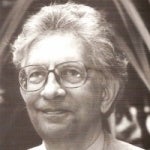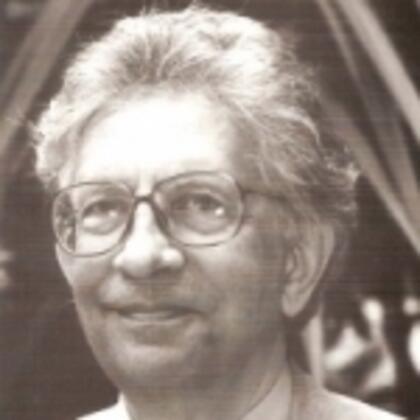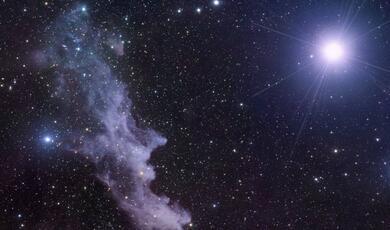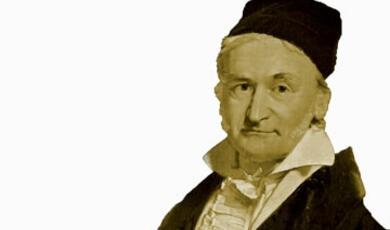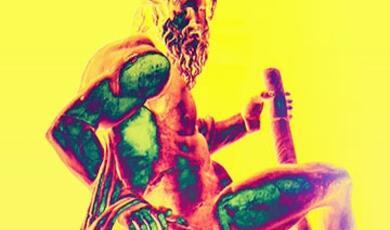Did the universe have a beginning?
Share
- Details
- Transcript
- Audio
- Downloads
- Extra Reading
If not, how has it gone through one infinity of years and another of days? What prevented it from beginning sooner? If it had a sufficient cause, how could that cause delay its effect?
Download Transcript
Did the universe have a beginning?
Professor Richard Sorabji
In the next two lectures, I shall consider whether the universe we live in is finite or infinite in time and space. Some people find infinite time frightening and dwarfing. It is rarer, though not unknown, to be horrified and disoriented by infinite space. For others, however, finite time might be disconcerting.
Some of you may have heard me broach this subject in a different way one and a half years ago in November 2001, when I asked if time might go round in a circle, so that your birth, your one and only birth, lay in two directions, both past and future. In that case, the life you have lived so far would also lie ahead of you in the future, though not to relive, because it only happens once. I discussed this in connexion with the fear of death and of having no more future to come. Time in that case would be finite.
I am now going to think of time in the normal way as going in a straight line, and I am going to ask not whether time is infinite, but whether the physical universe has an infinite history. It is only on certain views, we shall see, that that will tell us how long time itself lasts. If the physical universe had a beginning, then the universe will have had a finite history. Physics agrees that there was a big bang, from which the present state of the universe started. But on whether there were earlier bangs it has nothing to say. I shall start with three arguments against the possibility of a beginning for the universe.
Arguments Against a Beginning:
1. Why Not Sooner?
The first argument against a beginning is the Why Not Sooner? argument, devised as early as the 5th century BC by the Pre-Socratic philosopher, Parmenides. If you postulate a beginning for the universe, there is no conceivable reason why it should not have begun earlier than any time you care to imagine. We normally explain why something is delayed by pointing to earlier causal sequences to show that the time was not yet ripe. Socrates could not have been born much sooner because his parents had not yet met. But in the case of the whole universe beginning, there is no earlier causal sequence by reference to which we can explain why things had to wait.
Saint Augustine took this argument up nearly 900 years later around 400AD. He combined it with the question, 'what was God doing before he created the universe?', to which he gave the answer, 'preparing Hell for people who ask questions like that'. But Augustine also offered answers to our question. For one thing, he said, you might as well ask why God created the universe here rather than there. Yet no one seemed to be bothered by that question. More important, the answer to why the universe was not created sooner is that there was no sooner. At least, there was no sooner, if you take the view that there is no time in the absence of change, since changes occur only when there is a universe.
Ought we to accept this view, that there is no time in the absence of change? The view is widely held, and one argument in its favour is that the occurrence of time without change would be unverifiable. We think that only a few hours have elapsed since breakfast, but if there may have been time without change, we wouldn't notice it. We would not get hungry or bored and no clocks would mark the supposed time. So all we can say is that there has only been so much measurable time since breakfast, but there may have been other time. Some people would regard that as an empty and meaningless hypothesis.
I am not clear that there could not be evidence for pockets of time without change, although it is harder to think how there could be evidence for the idea of beginningless time before there was a universe and accompanying change. Some people have believed, as we shall see, that there is evidence that time comes along in tiny atomic packets, which have a positive size, but are indivisible. If they are indivisible, then nothing in the universe can change its state part way through a time atom, because there is no such thing as part way through an indivisible time. On the view that time is atomic, there would be tiny periods of changelessness before any change could take place. The length of the changeless atomic periods could be calculated on the basis of theoretical considerations, although I myself have not seen any such considerations that convinced me.
If only we could see without light moving, I once suggested, then we might see a period of changelessness, even though no clocks would tell us its length. Imagine that on a very still winter's day, you suddenly realise that nothing in your view seems to be moving or changing. After you realise that, not even your thought changes, for you just hold the thought, 'nothing is moving'. After what seems a considerable time, you notice a movement and your thought changes as it registers the change. It then turns out that everyone everywhere had the same experience of seeming to experience a time of positive, but immeasurable, length, in which everything seemed to have frozen. Might that not be evidence for a pocket of time free from change, though of immeasurable length?
What is harder to imagine is evidence for infinite time without change before the beginning of the physical universe. Suppose there were minds, which, at the beginning of the physical universe, all shared the impression that for as long as they could remember, an immeasurable period, they had been conscious, without any changes in their thought, of there being no change. Would that be evidence for there having been time without change before the physical universe began?
We entered into this discussion of the verifiability and conceivability of time without change, in order to understand Augustine's answer to the question, 'Why Not Sooner?' The universe could not have begun sooner, he said, if, in the absence of change, there was no sooner. And it is a real question whether the hypothesis of a sooner time is empty, because nothing could make such a time manifest.
Nonetheless, Augustine's ingenious reply, that there was no sooner, is not the last word. For there is a simple way of making sense of the 'Why not sooner?' question, as was seen by Leibniz in the 17th century. Suppose it is postulated that the universe began a billion years ago. That would be a billion revolutions of the earth ago, or an equivalent number of atomic oscillations ago, depending on what clock we wish to use. Then the 'Why Not Sooner?' question can be easily formulated: 'Why did not the universe begin a billion and one revolutions ago?' This is not to postulate time without change. For if there had been a billion and one revolutions before now, the extra revolution would have been an extra change.
The problem now is that once the 'Why Not Sooner?' question is given this sense, it is no longer clear that there could not in principle be a reason for the universe not starting sooner. We need only give as an example a possible reason, because the question was whether a reason is in principle impossible. It is not, because, for example, if, as Christians used to believe, mankind has existed virtually from the beginning of the universe, humans would have had longer to degenerate before facing the troubles of the present year. That could in principle give their Creator a reason for not allowing the extra revolution. The first argument against the possibility of the universe having a beginning has, then, failed. For the 'Why Not Sooner?' question turns out, once it is made intelligible, not after all to be in principle unanswerable.
2. Can a sufficient cause delay its effect? Can a changeless cause make something begin?
The other arguments against a beginning, unlike the 'Why Not Sooner?' argument, are most easily explained in theological terms. Suppose that, before the beginning of the physical universe, there was a non-physical Creator God, existing in time. This is not an uncontroversial view. Some would say that if there is a Creator, he must be outside of time, since he must create time in creating the universe. There cannot have been any time for him to exist in before he created it. But let us suppose that there was time, and that he existed in time before the universe began. His will is presumably a sufficient cause of the universe coming into existence. Why, then the delay? Can he have willed its existence all along, but delayed the taking effect of his will?
Or did he not will all along, but start willing after an infinite period of not willing the universe's existence? This would itself seem hard to explain, and besides there was a tradition from the time of Plato's Republic, Book 2, of thinking that God is changeless, on the grounds that any change in a perfect being would be a change to imperfection. This is not a good argument, unless it can be excluded that variation is itself a form of perfection, but the argument was influential. The assumption that God is changeless introduces a closely connected argument against a beginning of the universe: can a changeless cause make something begin? Would not a trigger be needed to supplement the changeless cause and trigger the effect?
The Islamic philosopher Ghazâlî provided an answer to this in the late 11th century. A Muslim husband can say to his wife, 'I divorce you - with effect from tomorrow'. Given Islamic law, the divorce will then take place tomorrow, apparently with no further triggering events, except the arrival of tomorrow. The husband's will, once formed, looks like a changeless cause that requires no further triggering events. And God's will, which may have existed always without needing to be formed, does not need the arrival of tomorrow, since there are no tomorrows before the universe begins. So this changeless cause needs no triggers.
The husband's will also looks like a cause which, given Islamic law, is sufficient and yet delays its effect. God, who does not need the support of any law, might then seem even more obviously to be a sufficient cause that can delay his effect. But the possibility of delay needs a little more discussion than the absence of a trigger. On the one hand, it may seem that the husband's will does not after all illustrate delay, if what causes the divorce is not merely his will today, but the persistence of his will right up to the moment of divorce, for his will might not persist. On the other hand, there may be other imaginable cases of delay. For example, if there were a freeze such as I described above in which nothing changed for a while, a cause operating just before the freeze would have to delay its effect until after the freeze. Moreover, in the case of God's will, there is no real possibility of its failing to persist, so that the persistence requirement is not really an additional one. In this respect, the case of the freeze is closer to the case of God's will. I conclude that these arguments against a beginning of the universe also fail. For God could be a changeless cause without a trigger and a sufficient cause with delayed effect.
3. Willing a change and changing one's will
A final theological objection to the universe having a beginning is that if God is its Creator, he would have to change his will in favour of the new situation of the universe existing, and, as we have seen, it has been widely thought that God should be changeless. But Augustine gave the classic reply to this again. Willing a change does not imply changing one's will. God could have changelessly willed that this change, the beginning of the universe, should occur.
With the failure of these arguments against a beginning, can we, then find an argument on the other side, to show that after all the universe must have had a beginning? The most impressive arguments are those that exploit paradoxes of infinity.
Arguments for a beginning; no infinite past
The idea of infinity generates apparent paradoxes if it is taken as the idea of a more than finite number. For this reason, modern school teachers often try to avoid that idea, and talk more cautiously of approaching a limit, or getting as close as you like. In this they are following the tradition of Aristotle in the 4th century BC, who said that infinity existed as an ever-expandable finitude. However large a finite number of something you had, there was no mathematical objection to your having a larger finite number. In this way, he avoided apparent paradoxes, such as the paradox that he mentions, that if the whole numbers were more than finite in number, then the even numbers, which form only half of the whole numbers, would be equally many. It seemed to him impossible that a sub-collection like the even numbers should equally be infinite. Nor did he see how you could finish going right through a more than finite number of anything.
I described two and a half years ago in December 2000 how, 850 years after Aristotle's death, the Greek philosopher, Philoponus, turned Aristotle's worries about infinity against the pagans on behalf of Christianity. Christianity was unusual in giving the physical universe an absolute beginning. But this was inevitable, Philoponus said, to avoid the paradoxes of an infinite past. If the universe had no beginning, then it would by this year have finished going right through a more than finite number of years. Moreover, how many years would it have finished going through next year? Infinity plus one. And how many days would it have finished going through by now? 365 times infinity. The number of years up to 2003 would be an infinite sub-collection of the number of years up to 2004, just the thing that Aristotle declared impossible. To avoid this, the pagans must concede to the Christians that the universe had a beginning.
Since I explained on that earlier occasion how Philoponus' objections eventually came to be answered, I shall postpone that explanation to the end, and for now relate some of the other paradoxes of infinity that writers have used in order to bolster Philoponus' argument for a beginning of the universe.
1, First, Aristotle's idea of infinity as merely an expandable finitude seems to fit perfectly with the infinity of future years, starting from now. Ought not the past years, therefore, also to be a finitude? Future years starting from now will admittedly never reach a more than finite number, but we need to understand the reason for this. It is because future years starting from now have a first year in the series. They cannot, therefore, also have a year of completion when a more than finite number of years has been reached, because there is not room to fit in a more than finite number of years, if one has both a starting year and a finishing year. But past years are different in the crucial respect, that they do not have a starting year under the hypothesis of a beginningless universe. There is, therefore, room for a more than finite number of years to have been fitted in by the year we have currently arrived at. And this will be true however far back we go. Whatever year we take, if there has been no starting year, there will have been room for a more than finite number of years to have occurred by that date.
2. Another objection to an infinite past takes it that there would have to be some year that was the infinitieth year ago. Alternatively, there would have to be many past years separated from now by an infinite gap. But that is a misconception. No single years are separated by an infinite gap. Infinity is not a property of any individual years, but of the collection as a whole. That the collection of past years is infinite does not imply that any particular year is infinitely distant. Compare how a crowd can be large, without any of the individuals in it being large.
3. An old objection is that one could not count an infinity of years. But counting is different from passing through. Counting has to start from a first number; so clearly, unless one can accelerate the counting indefinitely, one is not going to complete an infinite count. Passing through an infinity of years is different in that it excludes there being a first year. So passage through an infinity could have been completed already at any present or past year you choose to take.
4. An example of Bertrand Russell's has been exploited to try to show that an infinite past is impossible. Suppose that Tristram Shandy kept a diary at the very slow rate of one day recorded for every year lived. Russell said that no part of the diary would remain for ever unwritten. In fact this depends on whether the days are recorded consecutively. If Tristram only recorded each January 1st, gaps would be left forever. Moreover, even if he records consecutively, no time will come when all the days already have been recorded. Others have changed Russell's story and imagined that Tristram has lived an infinity of past years. It has been alleged that, in that case, he would have had time to write an infinity of entries and so would have been able to catch up, which is absurd. But this argument has innumerable flaws. First, it confuses the idea of infinitely many diary entries with the idea of all. There would have been time for infinitely many entries, but not for all, which is different, as we saw in the case of the even numbers not being all the whole numbers. Secondly, if the diary has no first year, he has no way of avoiding gaps by filling out all the days consecutively from the opening, because there is no opening. Thirdly, even if it were true that no day would for ever remain unrecorded, we have seen that it does not follow that a day will come when every day has been recorded. So the Tristram Shandy example cannot be used to discredit an infinite past.
5. I come to a last desperate attempt to discredit the idea of a more than finite number of anything, including past years. It is the case of Hilbert's hotel, which contains a more than finite number of rooms, every one of them full. Along comes a latecomer. 'Can you fit me in?', he asks. 'Certainly', says the manager, and then in a very loud voice he says, 'Will the occupant of room number one move into room number two? Will the occupant of room number two move into room number three? And so on.' We may have a feeling that at the far end of the hotel, some unfortunate resident will drop off into outer space. But there is no far end, so everyone remains accommodated and the latecomer moves into the vacant room one. This is offered as an absurdity, but in fact it is no more than the plain truth, and we shall see more clearly why in a moment.
One infinity larger than another.
Let me return to Philoponus in the 6th century AD. Of the two objections to a more than finite number that he borrowed from Aristotle, one was that one cannot finish going right through a more than finite number. This is not really true. As we shall see next time, this is not really true.Every time we travel any distance, we finish going right through the infinitely many fractions of that distance. But the other objection is more perplexing. How can the universe have gone through an extra year next year, when the number of years is already more than finite. How can one infinity be larger in this way than another?
The Greeks all thought this impossible, unless an almost undecipherable manuscript fragment of Archimedes turns out under ultra violet light to be expressing this idea. But the idea was known to the 9th century Islamic philosopher, Thabit ibn Qurra, who used one to one correspondence to prove that the natural numbers and the subset of even numbers have the same infinity. It was also known to the English scholar Grosseteste in the 13th century, presumably through a translation from Arabic. But it was not until the 14th century that Western philosophers were able to explain the sense in which one of these infinities can be, and the sense in which it cannot be, larger than the other. The two senses correspond to the words 'beyond' and 'besides'. If you imagine an infinity of past years, starting with the year 2003, stretching away from your right eye into the distance, and then imagine in matched pairs the years starting with 2004, stretching away from your left eye, the column of years that includes 2004 will form a larger set in the sense that it will contain all the years in the other column and one besides. On the other hand, it will not be larger in the sense of sticking out beyond the far end of the other column, because, as with Hilbert's hotel and its occupants, neither column has a far end.
It turns out, then, that the problems of infinity do not, as Philoponus thought, require the universe to have had a beginning. The situation, then, is this. Science is well aware that it does not know whether the universe had a beginning. The question was left to philosophers, many of whom have thought they could give a definite answer. The arguments we have looked at, first against and then for a beginning have been very ingenious. But in the end Philosophy turns out to be as inconclusive as Science.
What about Theology? One Christian idea is that our dependence on God's creation is more manifest if the world had a beginning, so increases our humility. But the 19th century Indian philosopher Ramakrishna, thought our humility would be increased if our world was only one of many like crabs on the beach. On the whole Indian Philosophy, like pagan Greek Philosophy, does not allow an absolute beginning to the universe, as Christianity does. At most some Greek and Indian schools allow new cycles in the history of the universe to begin. One Indian view is that an absolute beginning in the Christian style would make God responsible for all the injustices in nature[1].
Next time we shall consider whether space is or is not infinitely large and also infinitely divisible.
© Richard Sorabji
References:
1. See Anindita Balslev, 'The idea of a beginningless world process: Perspectives from the Hindu tradition', Annals of the New York Academy of Sciences, vol 950.
This event was on Wed, 14 May 2003
Support Gresham
Gresham College has offered an outstanding education to the public free of charge for over 400 years. Today, Gresham plays an important role in fostering a love of learning and a greater understanding of ourselves and the world around us. Your donation will help to widen our reach and to broaden our audience, allowing more people to benefit from a high-quality education from some of the brightest minds.


 Login
Login
